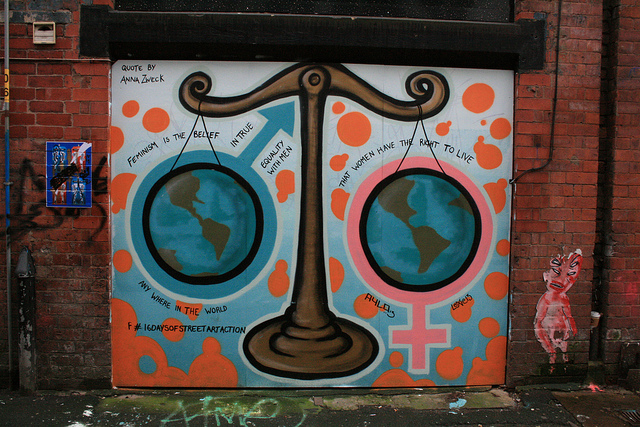2016 was said to be the year of the feminist.
Beyoncé dropped Lemonade in all its glory and was named Album of the Year by Rolling Stone magazine. Hillary Clinton ran for President. Despite the end of that story, she still won the popular vote by nearly three million votes, a glass ceiling-shattering feat for women everywhere.
Full Frontal with Samantha Bee debuted. American women completely dominated the Olympics in Rio. We found out Harriet Tubman would be replacing Andrew Jackson on the face of the $20 bill. Pantsuit Nation forms and sees an instant acceptance with soaring membership requests, and feminists everywhere embraced the term, “Nasty Woman,” with great fervor.
But, while feminism has seen a rise in popularity among pop stars, celebrities, and in our culture in general, the term “feminist” still has a negative connotation for many people. Why?
Feminism is defined by Merriam-Webster Dictionary as “the theory of the political, economic, and social equality of the sexes.”
It’s been around for many years, and what we’re seeing now is the third wave of feminism. The first wave occurred in the late 19th and early 20th centuries with the battle for women’s suffrage. The second wave occurred during the 1960s. The third wave is said to encompass the 1990s until the present day.
Each wave has added, and hopefully improved upon, aspects of the preceding one. The focus of the third wave? Intersectional feminism.
This feminism seeks to be inclusive of all feminists and not just white feminists. This wave encompasses people of color, the LGBTQ community, the disabled, and anyone else who has been previously excluded from feminist dialogue by a concentration on only one side of feminism.
To make it simpler, here are a few things that feminism is and isn’t:
- Feminism is not about hating men. Not at all. Even the most militant feminist might love men. That doesn’t mean we won’t shatter the patriarchy at the first possible opportunity because we recognize that “men” and “the patriarchy” are not one and the same.
- Feminists aren’t necessarily lesbians or bisexual, although some are. Feminism isn’t a term defining one’s sexuality.
- Feminism is not about hating chivalry. Want to open doors or pay for the check? Many feminists have no problem with chivalry, but chivalry and chauvinism are not the same thing. We appreciate one (chivalry) and despise the other (chauvinism).
- Feminism hasn’t taken anything from women. We haven’t robbed women of chivalry or the right to be stay at home mothers. But you’re welcome for being able to vote and having property rights. Use birth control? Thank a feminist. Enjoy being able to work outside of the home if that’s your thing? A feminist made that possible.
- Feminism has nothing whatsoever to do with tearing down other women. Women giving each other mad props for a job well done, for being successful, and for making a difference? That’s real feminism in action.
- Feminism isn’t about trying to be superior to men. If I’ve heard that once, I’ve heard that a thousand times. It has nothing to do with superiority and everything to do with equitable treatment. Men just seem to have this fear that we women will treat men the way they’ve treated us if we ever obtain equality. That should scare them but not because it’s true.
- Feminism has no beef with stay-at-home moms, domestic goddesses, or women who want to have a houseful of babies. We just happen to believe that it’s okay for women to choose to work outside of the home, never marry, and opt not to have children—if that’s their thing.
- Feminism doesn’t mean that we agree with abortion. Feminism means that we support other women’s right to choose what to do with their own bodies. Many feminists who identify as pro-choice would personally never have an abortion, but pro-choice doesn’t mean agreement. It means understanding that it might be someone else’s choice for a variety of reasons. Some of those might include: danger of the mother, rape, and incest. It means that we don’t think that a largely male government should ever dictate reproductive health when they’ve shown so little respect for it with legislation related to rape and assault and a justice system that generally favors the perpetrator over the victim.
- Feminism is about recognizing that “women’s rights are human rights,” as Hillary Clinton once said.
- Feminism that doesn’t include people of color, the transgender community, the gay community, or other minority groups, is typically considered “white feminism” and has fallen out of favor. The third wave of feminism has made efforts to be inclusive, although there is always room for improvement.
Feminism isn’t out to take anything away from men, or from other women for that matter. The year of the feminist has given rise to a movement where we are embracing our identity as women. We’ve been hit with ugly words and made them a battle cry and let them fall from our lips with the taste of laughter and not bitterness.
Nasty woman? Yes, we are! Nevertheless, she persisted? Yes, we did, and we do! Grab us by our what? We’ll just knit a whole bunch of pussy hats and wear them proudly. We’re taking every ugly thing and turning it into a strength, and it’s a beautiful movement.
It’s not about taking something from anyone else. It’s about being recognized as fully human and equally deserving of a life that doesn’t include a sexual assault just because we’re born (or identify as) women. It’s about having an equal say in government because we’re represented there. It’s about wanting to live in a place where if anyone can be president, and that anyone includes a woman.
Feminism is an inspiring movement that seeks to liberate all women from oppression. It’s this amazing body of individuals all working so that rape culture and misogyny don’t get the final word, so that the rights enjoyed by men freely, can be enjoyed by all.
It’s imperfect and filled with flawed people, but it’s about working for all women and not just ourselves. And it’s even working to free men from the constraints imposed by the patriarchy.
Once, feminism gave us the vote. Then, it gave us our right to own property. To attend school. To work outside the home. It gave us birth control. The right to choose. It gave us our first damn near successful run at the White House. And so many heroines—too many to name.
Some people say that they don’t identify as feminist. And I say, “Well, then. Why not?”
~
Author: Crytal Jackson
Image: Kyla Borg/Flickr
Editor: Lieselle Davidson
Copy Editor: Khara-Jade Warren
Social Editor: Taia Butler


 Share on bsky
Share on bsky





Read 0 comments and reply